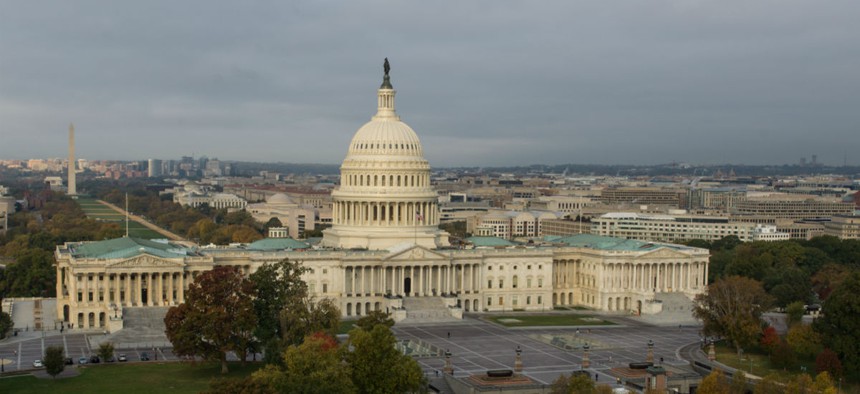
Architect of the Capitol
House Republicans Push for Expedited, Consolidated 2018 Spending Bill
Democrats want regular order, say there’s not enough time to pass omnibus legislation this summer.
Congress should move forward swiftly with an omnibus bill to fund all federal agencies for fiscal 2018, according to a group representing more than 150 Republican lawmakers, which is pushing the approach in lieu of the more deliberate regular process.
A consolidated, full-year appropriations bill would avoid the political gamesmanship that has plagued the spending process for years, the Republican Study Committee said. Under “regular order,” appropriations committees in both the House and Senate would consider 12 distinct funding bills, each of which would require votes by the full chambers after moving through the respective panels. Lawmakers have consistently skirted that process, however, instead relying on short-term stopgap measures to bide time as they negotiate 11th hour deals. Congress last year passed a full-year spending bill in May, just five months before the end of fiscal 2017.
Rep. Mark Walker, R-N.C., who chairs the RSC, said the process was not just broken, but also failed to deliver on Republican priorities.
“The game of financial and political brinksmanship has yielded few, if any, victories for conservatives,” Walker said. “We cannot keep punting this problem and should be proactive rather than reactive.”
Matt Dennis, a spokesman for Rep. Nita Lowey, D-N.Y., the ranking member of House Appropriations Committee, said Democrats are committed to regular order, and the proposal from the RSC is “pretty much the opposite of that.”
Both the House and Senate appropriations panels are holding subcommittee hearings this week to solicit information from the Trump administration and move the 12 funding bills forward. Given the early stages of that process, moving an omnibus bill through Congress before the August recess, as the group is pushing, could prove unworkable.
“We’re far behind schedule,” Dennis said.
Jay Tilton, a spokesman for Sen. Patrick Leahy, D-Vt., the Senate Appropriations Committee’s vice chairman, said his boss has been an advocate for restoring regular order to the spending process.
“This is still his goal, and he looks forward to working with Chairman [Thad] Cochran[, R-Miss.,] to achieve this with the annual spending bills.”
Chris Gallegos, a spokesman for Cochran, said the committee is currently reviewing the Trump administration’s requests and has not made any decisions on the timing of when the committee would hold votes.
While the committees are currently working on individual bills, Dennis cautioned against assuming Republicans would continue that approach on the House and Senate floor.
“They could be lumped together,” he said. Congress last passed all individual spending bills prior to the start of the fiscal year in 1997. Since then, lawmakers have passed an average of six CRs per year.
Lawmakers have until the end of September to pass some sort of spending measure to avoid a government shutdown. President Trump has seemingly advocated a shutdown, while Democrats have threatened to abide him if Republicans refuse to raise spending caps for domestic agencies.







